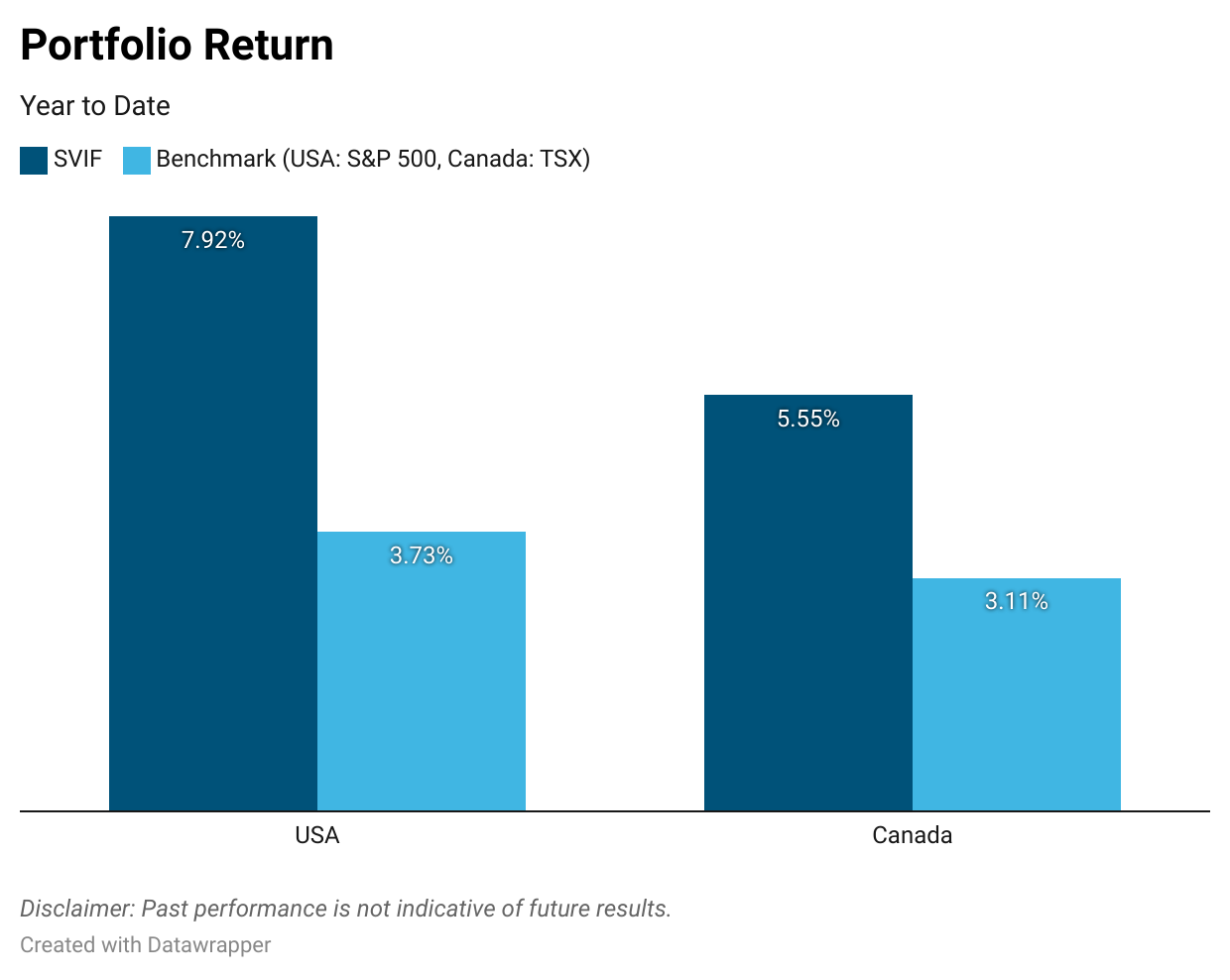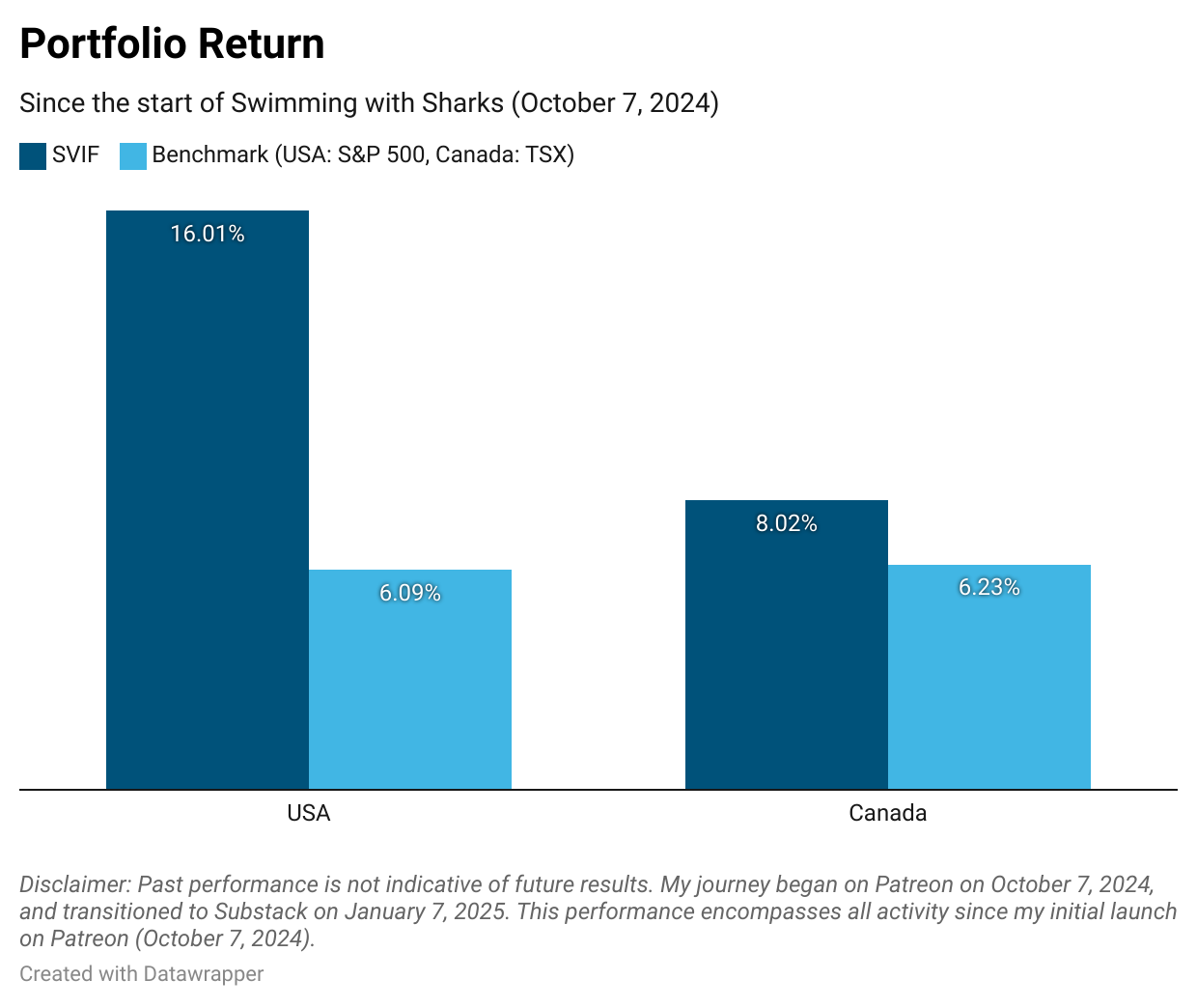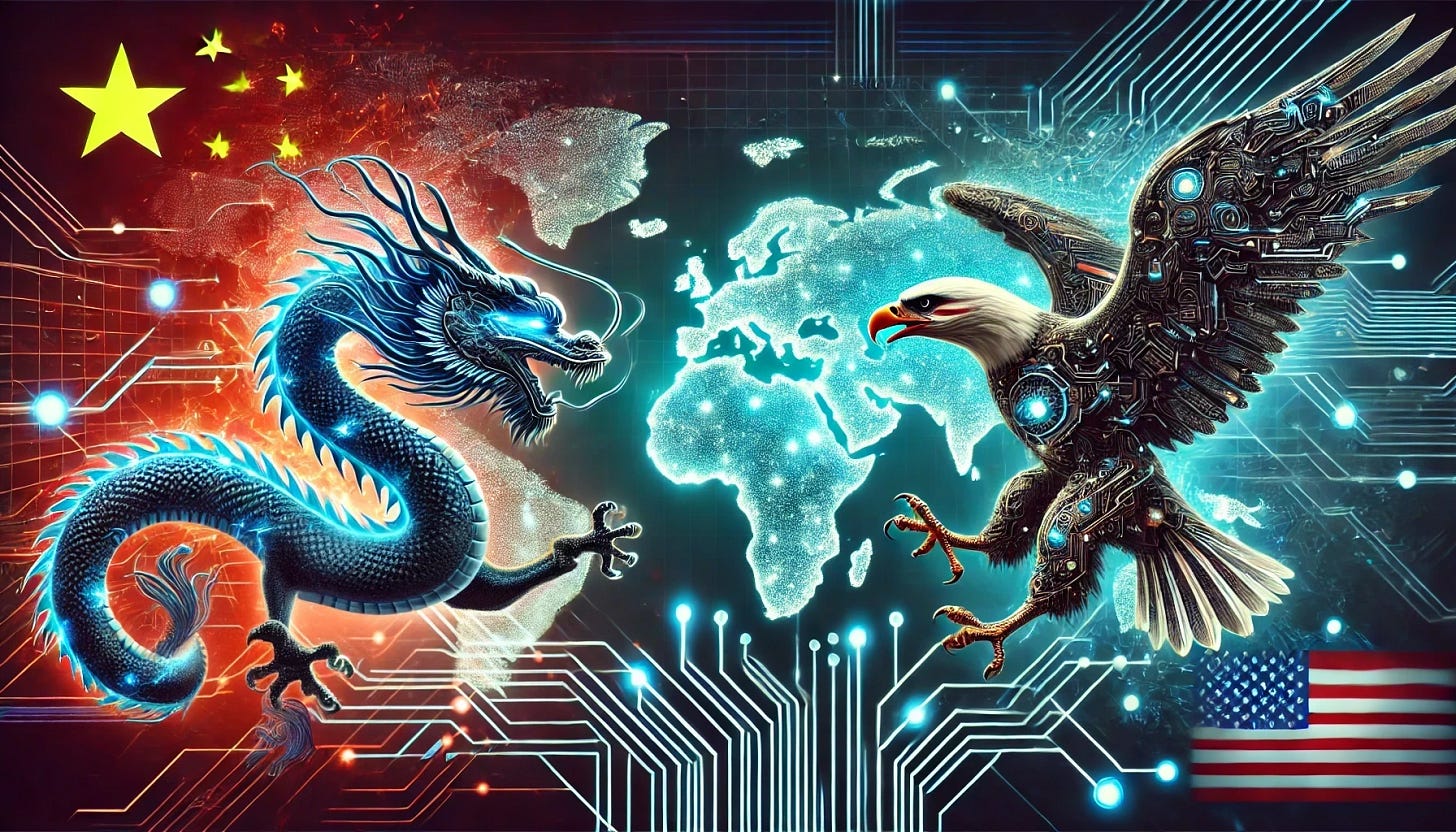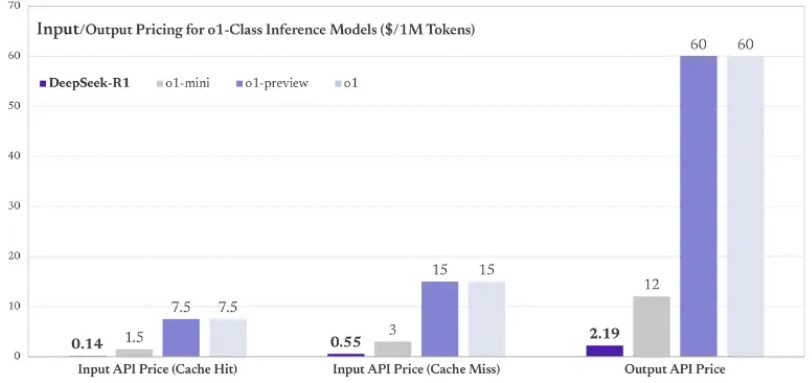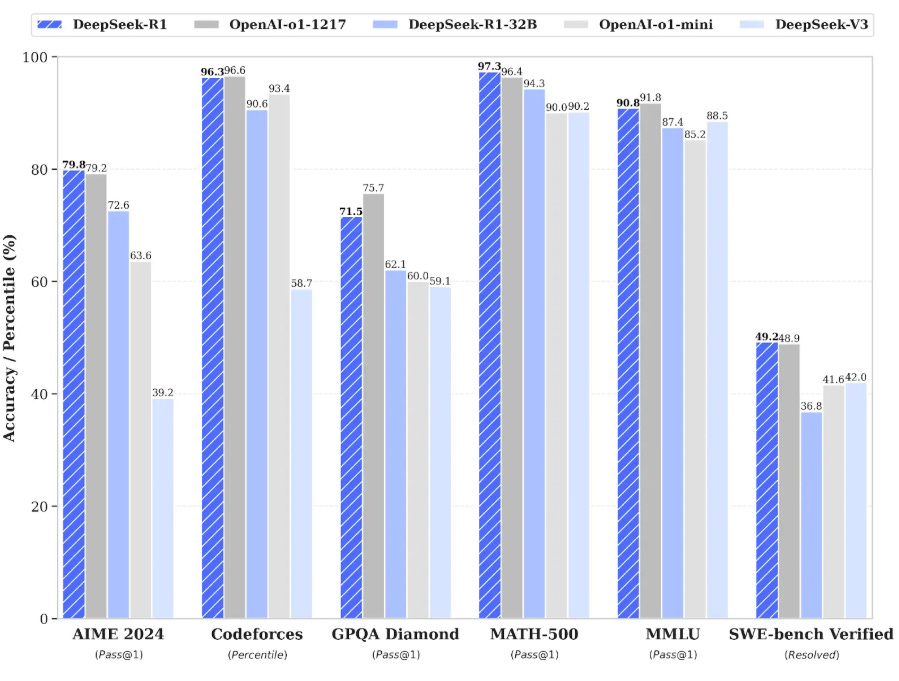Weekly #14: Can AGI Crown China as the World's Next Superpower?
China’s DeepSeek is challenging OpenAI and Meta with its groundbreaking AI, raising critical questions about power, democracy, and the future of global dominance.
Since the start of 2025, both portfolios have delivered returns double those of the benchmark.
And since the launch of SwS, not only are both portfolios beating the market, but the USA portfolio returned 2.6x the benchmark.
Can AGI Crown the Next Global Superpower?
This week the markets continued their climb with the S&P reaching 6,100. Oil dipped slightly to $76, and the Fed appears likely to keep interest rates steady. Meanwhile, the housing market continues to struggle due to the high borrowing costs. These are market recaps for this week that you’ll find on many sites. But as Sharks, we’re not here for the short-term ripples—we’re here to focus on the undercurrents shaping the future. This week, one event stood out—an undeniable sign of the imminent shift in global power dynamics.
Recent events continue to show cracks in the West’s dominance. Russia’s invasion of Ukraine, with little regard for US opposition, marked a turning point in the perception of American influence. Iran’s growing partnerships with China and Russia further challenge Western-led coalitions. Meanwhile, China has extended its global influence through the Belt and Road Initiative and significant inroads in African and Latin American economies. Each of these signals a changing tide, but the most transformative threat may come from the AI race, specifically the development of Artificial General Intelligence (AGI).
This isn’t the first time we’ve seen technology shape the balance of power—think back to the Space Race during the Cold War. The Soviet Union’s launch of Sputnik in 1957 sent shockwaves through the West, spurring a massive wave of innovation and investment in response. Technology has consistently been a decisive factor in changing global superpowers. From the industrial revolution propelling Britain to dominance, to the advent of nuclear weapons solidifying the US and Soviet Union as global powers, breakthroughs in technology have always shifted the geopolitical landscape. Even earlier, innovations like gunpowder fundamentally changed the nature of warfare and altered empires' trajectories.
Click the ❤️ button to help more readers discover this post on Substack.
This idea was even dramatized in the film The Great Wall, where advanced Western weapons introduced into ancient China symbolized the transformative role of technology in shaping the balance of power.
The AI race today echoes these historical tensions, with nations vying for technological supremacy that could redefine global influence. Just as the Space Race determined dominance in the 20th century, the race for AGI could shape the 21st.
From China’s perspective, this race isn’t just about technological dominance—it’s a linchpin in its long-term strategy to reshape the global order. AGI represents an opportunity for China to leapfrog existing economic and military paradigms, enabling it to dominate key sectors like cybersecurity, finance, and defence while consolidating influence in emerging economies. China’s centralized approach, coupled with vast state support for R&D, allows it to prioritize national goals over private profits. This strategic alignment between government and industry, often lacking in Western democracies, positions China uniquely to focus its efforts on AGI as a means to solidify its standing as a global superpower.
DeepSeek, a Chinese AI startup, developed a cutting-edge AI model comparable to those from OpenAI and Meta, but here’s the kicker: they did it with just $6 million. Compare that to Meta, which plans to spend up to $65 billion on AI in 2025, and OpenAI, which is on track to spend $7 billion this year alone.
Meanwhile, DeepSeek achieved its breakthrough through a combination of smart strategies. Their cost-effective AI models, DeepSeek-V3 and DeepSeek-R1, have outperformed their counterparts at a fraction of the cost by leveraging the Mixture-of-Experts framework and reinforcement learning.
DeepSeek R1 vs. OpenAI o1: Price Comparison
Instead of building from scratch, they refined open-source models and focused on specific, high-impact problems, keeping their approach simple and efficient. By utilizing cost-effective cloud tools, optimizing hardware, and eliminating unnecessary model components, they significantly cut down on training costs. I am no expert on the technical side, but if you want to check the detailed comparison between DeepSeep and OpenAI, you can read this.
DeepSeek R1 vs OpenAI o1: Comparison of Different Benchmarks
Here is the video I found from CNBC about DeepSeek’s breakthrough:
Let’s talk about AGI. This isn’t just smarter AI that can write essays or play games—it’s artificial intelligence with human-level cognition, capable of performing any intellectual task across any domain. If China achieves AGI before the West, the consequences could be profound. AGI could revolutionize cybersecurity, giving China dominance in information warfare. It could lead to unparalleled advancements in autonomous weapons and military strategy, challenging the balance of power. Economically, AGI could allow China to leapfrog the West in innovation and efficiency, solidifying its position as the world’s leading superpower. The ripple effects would touch everything from trade to technology and even the democratic values we often take for granted.
Share the Love! Invite friends to join our community and earn rewards!
However, AGI also raises pressing ethical questions that transcend national boundaries. Who controls such a powerful tool, and how do we ensure it is used responsibly? If AGI falls into the hands of authoritarian regimes, it could be weaponized to suppress dissent, surveil populations, and undermine individual freedoms. Even within democracies, unchecked AGI could exacerbate economic inequality, eliminate millions of jobs, and challenge our legal and moral frameworks. The race for AGI isn’t just about who gets there first—it’s about how we address the profound ethical dilemmas that come with such transformative technology.
Consider the immediate impact on investors. Tech companies in the US, long seen as the crown jewels of innovation, could find themselves outflanked. The defence sector might face obsolescence if China's AGI capabilities render current technologies inadequate. Global markets could experience heightened volatility as geopolitical tensions escalate. But these concerns, while critical for markets, must also be framed within the broader ethical and societal implications of AGI. If authoritarian regimes gain control of AGI, they could use it to suppress dissent, surveil populations, and destabilize democratic societies. Even in democracies, unchecked AGI could deepen inequalities and raise complex legal and moral challenges.
So, what can the West do?
First, governments and private companies need to recognize AGI as a matter of national security, not just an economic race. While the US has begun to recognize the threat, as evidenced by measures like the Biden administration's limitations on certain chip exports to China in 2022, it’s clear this response was too little, too late.
In 2022, the US government made it illegal to export advanced AI chips to China, aiming to limit their AI capabilities. Despite these measures, China managed to stockpile thousands of chips through an international smuggling network. The recent restrictions aim to close loopholes and make it even harder for China to obtain cutting-edge AI chips, but the fact remains: these efforts were insufficient to prevent DeepSeek's breakthrough—a stark reminder of the strategic gap that must be urgently addressed.
Secondly, we need smarter, not just bigger, spending. DeepSeek’s success shows that efficiency can outpace brute force. The West must prioritize targeted advancements, like refining models and optimizing hardware, rather than solely chasing scale.
But is it too late?
Not yet, but the window is closing. China’s rise in AI isn’t just about technology; it’s about a strategic focus that leverages resources for maximum impact. The West must act now to close the gap, or we risk entering an era where technological and geopolitical dominance shifts eastward, potentially altering the global order for generations.
This is a call to action. As citizens of the democratic world and protectors of our values, we must wake up and push for the innovation we need to safeguard our way of life for ourselves and future generations.
Let’s not be fish—let’s fight to protect what truly matters.





